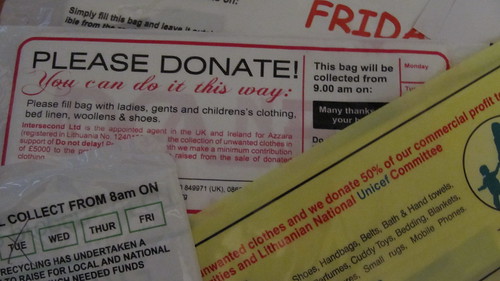Charity Commission warns against bogus clothing collections
The Charity Commission is once again warning people to avoid contributing to clothing collections that appear to be charitable but which aren’t. It is reminding them of the advice on how to ensure your donations go to a genuine charity.
The Commission issued its warning after receiving calls from people who had been given misleading leaflets which suggested that the proceeds of a clothing collection would go to charity or charitable causes when in fact they would only benefit a private business or individual. The Commission is also aware of recent cases where fraudsters have used the name, logo and charity registration number of a genuine charity to appeal for donations and keep the profits.
The Commission pointed out that most collections for charities are genuine and provide them with an important source of income, so people should not be discouraged from donating to collections carried out by genuine charities to raise funds for a legitimate charitable cause.
Photo: Some of the charity clothing bags that arrive on the doormat
The Commission is issuing the following advice for people who want ensure their donations reach those most in need:
• Most genuine collections will be raising funds for a specific individually named charity. Be wary of misleading leaflets that do not use the words ‘registered charity’ but instead use pictures or wording that give the impression that the appeal is charitable. You should be suspicious of any leaflet that does not state the name of the charity your donations will go to.
• If a collection is for a registered charity, legally this must be stated on any document advertising the collection of clothes or other property on behalf of the charity. Genuine leaflets will usually provide a charity registration number. Most door to door collections will leave at least two days before they collect any donations, allowing you time to check the Charity Commission’s online register of charities.
• If you are still unsure about a whether a collection is genuine for any reason, for example if it looks unprofessionally produced, is badly written or contains spelling mistakes, and you still wish to give, you should try contacting the charity to check that the collection is legitimate. If the leaflet only gives mobile numbers or none at all, it may be a sign that the organisation is not collecting on behalf of a legitimate charity. Registered charities will be happy to provide contact details and confirm whether a collection is on their behalf or not.
• Some advertising leaflets will give the impression they are from a charity but provide a company registration number. This is not the same as a charity registration number and may be a sign that the organisation is operating commercially for profit and is not charitable.
• If a clothing collection will benefit a charity, it is required to have a public collection licence from the local authority. To check whether a collection has a licence before donating any item you should contact your local authority.
• If you remain concerned that your donations may not reach a registered charity, you can give directly to your local charity shop or at an official charity clothes collection point.
To complain about a misleading leaflet appealing for clothing donations, you should contact your local Trading Standards Service.
If you receive a bogus leaflet that falsely uses the details of a genuine charity, the collection may be unlawful and you should report this to the police. In either case, the Charity Commission asks that you notify it as well so that it can gather information on offenders and work with its partners to combat and raise awareness of fraud.
www.charitycommission.gov.uk



